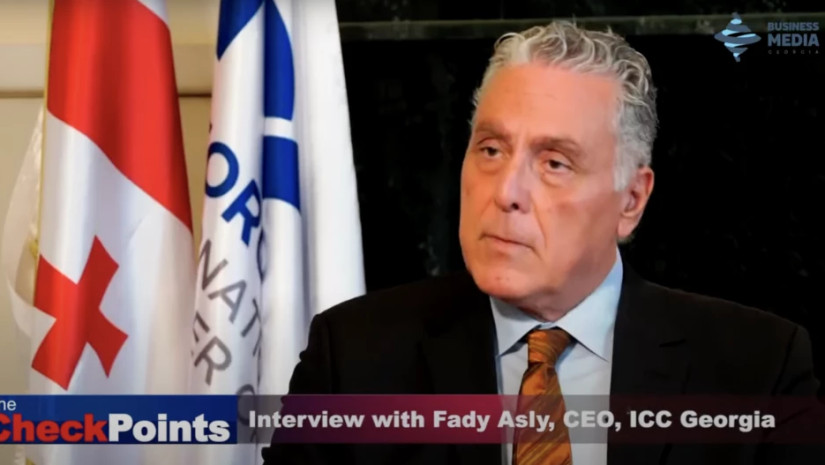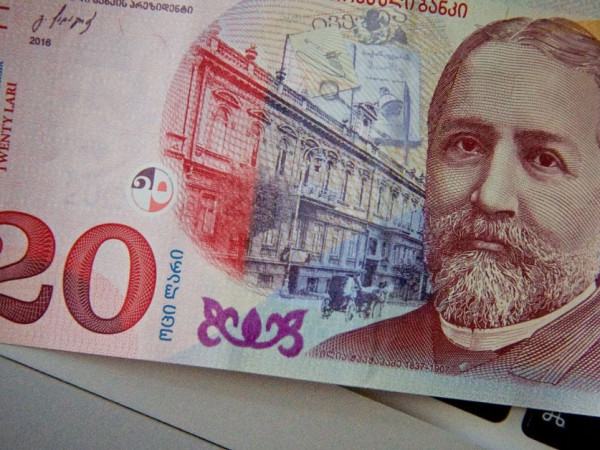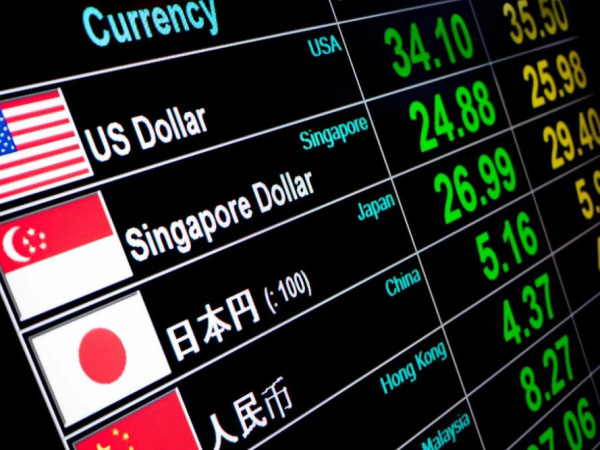The current strengthening trend of GEL raises some questions not only in the local but foreign business community as well. Fady Asly the CEO of the International Chamber of Commerce of Georgia summed up all of them in one interview. Investments, namely FDI, were another big topic that we have discussed in the sit-down interview with the CEO of ICC Georgia.
Elene Kvanchilashvili: I read your Facebook post where you wrote that you could not really understand the current trend of the lari strengthening. What we hear from the experts is that this strengthening is mainly driven by three forces. One is dollar depreciating globally, Georgia's exports, increasing, trade figures generally and also remittances. Why do you think that these fundamentals are not sufficient for these tendency?
Fady Asly: I use my logic more than I use the figures. I want to compare 2021 to 2019 which was the last normal year before the pandemic. In 2019, the lari was devaluing. That was the trend. At a time the economy was much stronger than it is now 2021. If you look at the figures of 2021, you see that from the tourism we got like one third of what we had in 2019. This means we are missing two billion dollars compared to 2019. Foreign investment is totally non-existent. Exports have increased, but imports have increased even more. So if you use arithmetics, you realize that there is no explanation why the lari should strengthen to that extent. In addition to that, we have chronic political instability. We have external political instability. So when I look at the picture like this, it doesn't make sense to me from the macro economic angle how the lari can strengthen to that extent unless there are dollars being injected in the economy that we don't know about. Now to go back to the foreign remittances that have increased because people need money.
Most families have people who are living abroad who send them money and because of the hardship due to the pandemic, people abroad, Georgians abroad are sending more money. In addition to that, more Georgians have left Georgia in the past two years, so they are sending more money. The remittances are like about 2.5 Billion. This means that they have increased by one billion, compared to 2019 because it was about 1.3 Billion in 2019. This one billion dollars does not justify the strengthening of the lari since the 15th of November at this speed. This means that there is something going on with the lari that goes beyond my understanding as a businessman and as someone who looks into those figures. I cannot explain it with the parameters that we have in hand. Only the National Bank knows the truth. But honestly, I don't believe that they are telling what's going on.
Elene Kvanchilashvili: You also said that you feared that these "gymnastics" with the lari, as you called it, would backfire. What do you mean more precisely?
Fady Asly: Yes, it will backfire because, you know, there is something called the pendulum effect. If you know, in those old clocks, you have a pendulum of the clock that goes left and right. When you take the pendulum and you hold it artificially to one extreme and then you release it doesn't stop in the middle, it goes to the other extreme. So, my personal opinion is that dollar will devaluate very quickly at one stage. This means that now people want to keep their money in lari and because they feel that dollar is strengthening. But this is a very dangerous game. And one morning we can wake up and realize that lari became 3.5. If you remember, for the past eight years, every time the lari devalued, the government said yes because our trading partners currencies is devaluing - that's why we are devaluing. Well, today the Turkish lira is devaluing and the ruble is devaluing. Why is the dollar is strengthening? I'm following their own logic. Why is it that before when it was devaluing, we would link to the devaluation of the trading partners. And now they are devaluing and we are strengthening? There is something that does not make sense in all this.
Elene Kvanchilashvili: eliminate the spillover effect that the tightened monetary policy could also have on the Lari strengthening?
Fady Asly: Everything has an effect, but not to that extent. This means the strengthening from 3.2 To 2.9 In the span of two months goes beyond the tightening of any policy. The tightening of the economy policy cannot have such an immediate effect on the strengthening. To to make it very simple. There are a lot of dollars entering in the economy, but we don't see that. This means that probably the banks are selling a lot of dollars and buying a lot of laris. This can be something that we don't see in the economy because it's not accounted for. The national bank would know this. This means if the banks are selling their own reserve, the private banks and buying laris, this would strengthen the dollar. So why are the banks doing this? I don't know. And also, we have to understand that as the strengthening of dollar or the devaluation of the lari to strong extremes is very bad for the economy. Because if you look at our exports for the past year, the exports were increasing steadily. When you strengthen the lari you become less competitive. Exporters will be suffering now.
Elene Kvanchilashvili: In this current situation and considering the pandemic, would you say that strengthened lari is helping to the more certainty for doing business in Georgia? What does your experience of doing business logic tell you?
Fady Asly: What we need is stability of the currency. We need a stable currency so importers can build on it, exporters can build on it and people get used to it. So there will be no problem with the inflation and no handicaps for the exporters. Now, the only factor that is positive for the government when the dollar strengthens is the ratio of debt to GDP decreases. You know, we were at like 60-61% percent because the dollar was at 3.3. Now, when the dollar is at 2.9, we were at definitely lower than 60%. Now, if the government has a goal to borrow more money because the ratio went down, now is the perfect time for them. So I'm wondering to myself, is it again that the government is kind of playing to borrow more money because the ratio has gone down based on what the IMF has? I don't know. There is something abnormal. That's a fact. Such a strengthening in such a short time is abnormal. It does not make sense when you look at all the economic parameters.
Elene Kvanchilashvili: You mentioned that FDI is practically nonexistent in Georgia. I would agree this is the weakest point of this fundamentals that we talking about when talking about strengthening. I don't know if you're following currently, but US Ambassador has been very vocal about the foreign direct investment and also bringing the example of Anaklia. Do you think that Georgia is facing missed opportunities?
Fady Asly: Look, Georgia has a lot of potential for foreign direct investment. A lot. In my opinion, if there was a sound policy from the government to encourage foreign investment, we could easily have four to five billion dollars a year, if the government was foreign investor friendly. It's not subject of a debate anymore. The government doesn't want FDI. The government doesn't want foreign investors. They want foreign investors may be coming from Australia, New Zealand and and Western Europe with the limit being the the city of Marseille in France? They don't want any foreign investor south of the city of Marseilles. The government has xenophobic policies. It's obvious. That's why I don't want to debate FDI. The government should change policy. As long as this government is in power with this vision regarding foreigners, there will never be FDI in Georgia. The government has done its best to screw foreign investors, whether by cancelling their residences, confiscating the residences, refusing to give them residences after they did their investments here, defrauding them in the courts, helping the Georgians who screwed foreign investors in the courts. All the policy of the government has been to undermine foreign investment in Georgia. Everything from the day Bidzina Ivanishvili came to power this has been his line. He doesn't want foreign investors in Georgia. `so we have two speeches. We have the speech of the government that says we want foreign investors, which is total nonsense. And then you have the security services who are doing their best to scare off foreign investors. If you look at the figures, the first three quarters of 2021, we have 730 million dollars of foreign direct investments. 85% of it is reinvestment. Most of them are Georgian companies that are registered abroad. Then you have a 4% that is foreign debt that we borrowed. Then we have equity investment, which is the real foreign investment. Maybe not even real, because probably some Georgian companies are registered in some fiscal paradise somewhere. We have very few foreigners coming here and those who are coming, they buy an apartment or something like this. It doesn't really move the economy that much. If you look at the figures of 2021 and you look at the green field foreign investment in general worldwide compared to 2019, there was a decrease of 30 % worldwide in green field foreign direct investment. In Georgia, the decrease was 80%. So the it's way more than the average. Georgia is one of the countries where the greenfield foreign investment was the most decreased in the world, it ranks among the last seven or eight countries. All this is because the government doesn't want FDI. So, let's stop trying to even speak about it, because as long as this government is going to be in power, there will not be foreign investment in Georgia. The problem is that even if the government changes, we have a new government or even if the government changes policy and then they say,"no, no, let's open it for everyone," it will take four or five years to regain some credibility.
Elene Kvanchilashvili: What does your personal experience of doing business tell you?
Fady Asly: I deal with FDI. I have a consultancy firm based in Dubai, and we bring investors to the whole region here and to Africa and everywhere. `When we speak to them about Georgia, everyone says, "no, no, no Georgia". When we speak to them about Albania, they say, "No, no no Bosnia." Those are the two countries that they don't want to touch because those two countries screwed foreign investors in the past. Bosnia by increasing the taxes. At a time they had promised that the taxes would not change. So, all those who invested, they got screwed. And Georgia, because they screwed every foreign investor who came here.
Elene Kvanchilashvili: You talked about the xenophobic attitudes of the government to certain investors. The US ambassador mentioned US helping Georgia with the critical infrastructure of investor screening mechanism. Do you think that could be one direction that could help eliminate what you were talking about?
Fady Asly: Everything that's being done could help, but the issue is to have investors coming in. Who can protect them? Do you think that the U.S. Embassy can protect an American investor here? Look, what happened to Anaklia. This was mainly American investment. They couldn't protect them. No one can protect foreign investors here. That's why I don't bring foreign investors to Georgia because I cannot protect them. This means if they have a problem and they came under my responsibility, I cannot solve that problem. So all this are kind of carrots that the U.S. government is showing the government trying to entice them. Bidzina Ivanishvili does not want foreign investors here. It's as simple as that.















